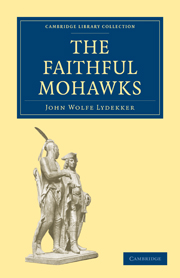Book contents
- Frontmatter
- Contents
- ILLUSTRATIONS
- FOREWORD BY THE RIGHT HONOURABLE LORD TWEEDSMUIR, G.C.M.G., C.H.
- PREFACE
- ABBREVIATIONS
- INTRODUCTION
- Chapter I PRELUDE (1664–1704)
- Chapter II THE FIRST DECADE (1704–1713)
- Chapter III THE NEXT THIRTY-THREE YEARS (1714–1746)
- Chapter IV THE CONFLICT FOR CANADA (i) (1747–1755)
- CHAPTER V THE CONFLICT FOR CANADA (ii) (1756–1760)
- CHAPTER VI THE YEARS BETWEEN (1761–1774)
- CHAPTER VII THE REVOLUTIONARY WAR (1775–1782)
- CHAPTER VIII “THE FAITHFUL MOHAWKS” (1783–1807)
- Appendix
- BIBLIOGRAPHY
- INDEX
- Plate section
- Frontmatter
- Contents
- ILLUSTRATIONS
- FOREWORD BY THE RIGHT HONOURABLE LORD TWEEDSMUIR, G.C.M.G., C.H.
- PREFACE
- ABBREVIATIONS
- INTRODUCTION
- Chapter I PRELUDE (1664–1704)
- Chapter II THE FIRST DECADE (1704–1713)
- Chapter III THE NEXT THIRTY-THREE YEARS (1714–1746)
- Chapter IV THE CONFLICT FOR CANADA (i) (1747–1755)
- CHAPTER V THE CONFLICT FOR CANADA (ii) (1756–1760)
- CHAPTER VI THE YEARS BETWEEN (1761–1774)
- CHAPTER VII THE REVOLUTIONARY WAR (1775–1782)
- CHAPTER VIII “THE FAITHFUL MOHAWKS” (1783–1807)
- Appendix
- BIBLIOGRAPHY
- INDEX
- Plate section
Summary
The successful administration of native races in all parts of the world is one of the most prominent achievements of the British nation. The great territorial acquisitions which now form the units of the Empire are not only a proof of the hardihood and vision of bygone adventurers and colonizers, but are also an eloquent testimony to the wise and farsighted statesmanship which has been extended to the indigenous peoples under our sovereignty.
Upwards of three centuries have passed since the commencement of our earliest attempts at native administration which began among the great Iroquois confederacy of North American Indians, but in this instance the term “administration” must be narrowly construed. The Iroquois looked upon themselves as the powerful allies of the English—which indeed they were—with whom they were prepared to unite against the insidious encroachments of the French.
In the history of their own country the Iroquois were outstanding as the predominant confederation of the North American continent, and with the coming of the white man they became a vital factor in the schemes for American colonization. From the establishment of the first Dutch settlement at Manhattan at the beginning of the seventeenth century to the close of the War of Independence nearly 200 years later, the Iroquois exercised the most profound influence upon the destinies of the colonies. Of this great Indian confederation the warlike Mohawk tribe had long been regarded as the “elder brother” in the symbolical chain of the “Five Nations” league.
- Type
- Chapter
- Information
- The Faithful Mohawks , pp. xv - xviPublisher: Cambridge University PressPrint publication year: 2010First published in: 1938



